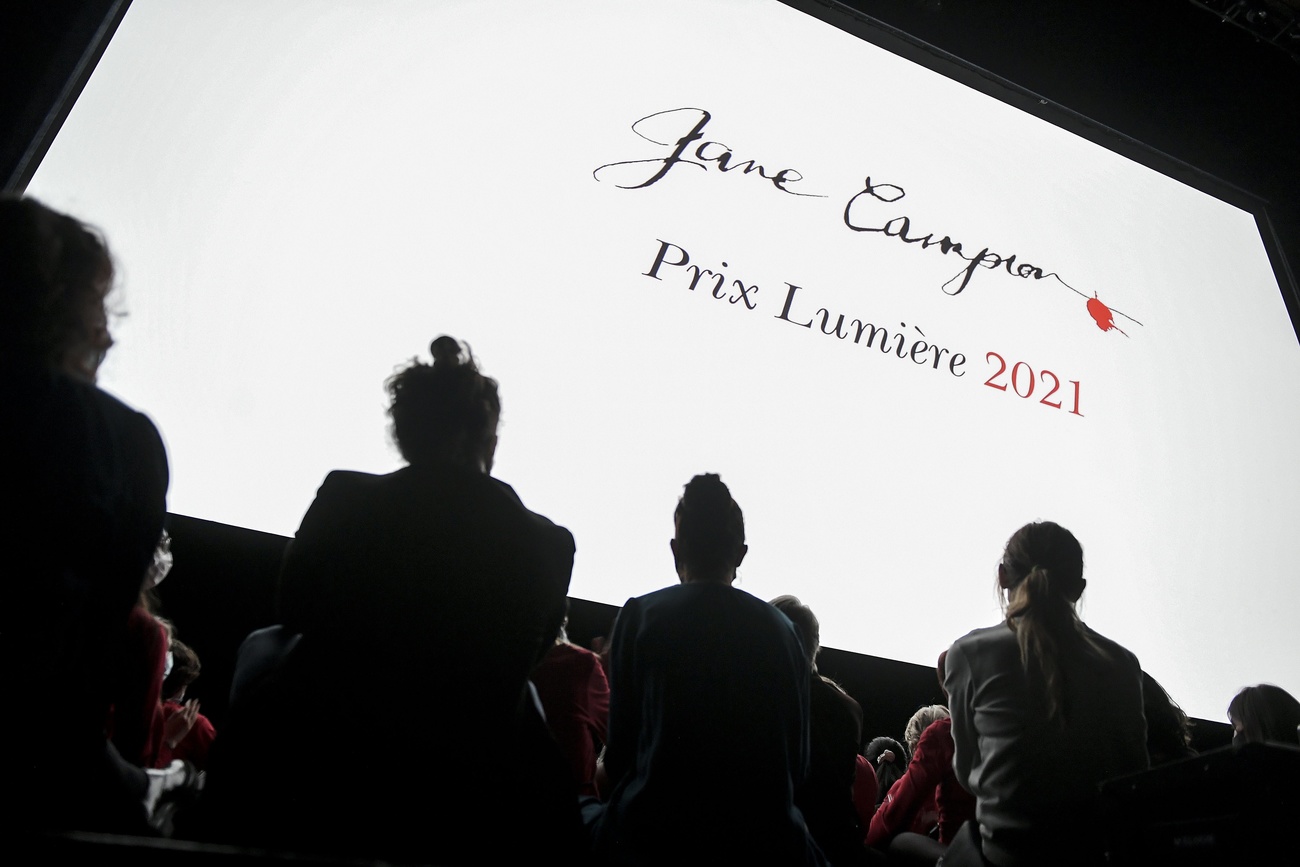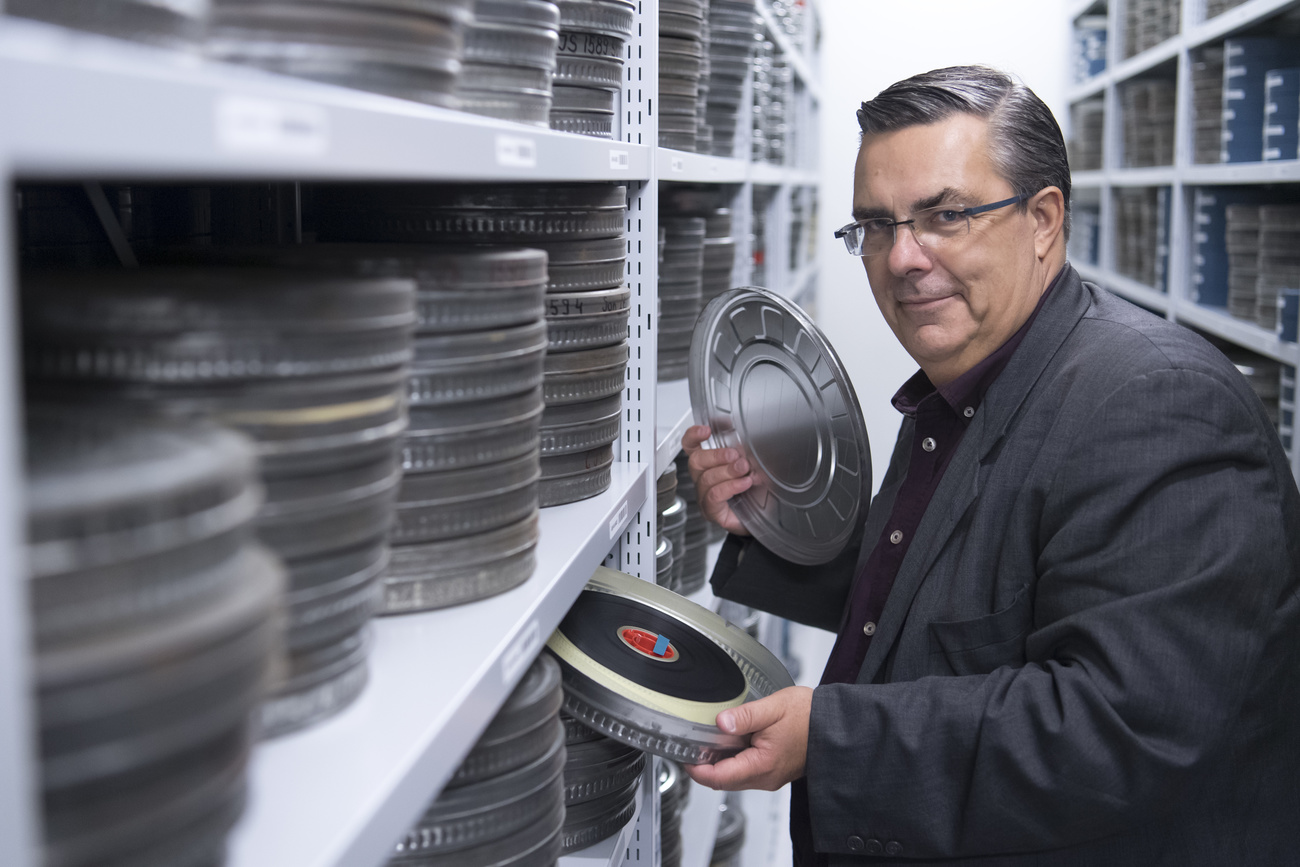Swiss cinema elbows its way to a place among European giants

Switzerland was a special guest at Lyon's Festival Lumière that ran from October 9 to 17. What does this mean for the Swiss film industry’s international standing? And where does it go from here?
In 2021 all three of the major European film festivals had at least one Swiss title as part of their programme: the Berlinale’s Encounters section welcomed Andreas Fontana’s banking thriller Azor and the Zürcher brothers’ drama The Girl and the Spider; the Critics’ Week in Cannes featured the world premiere of Elie Grappe’s Olga, subsequently chosen as the Swiss hopeful for the Best International Feature Film Oscar; and Venice used its new Notti Veneziane sidebar to play host to Stefano Knuchel’s Hugo in Argentina, the second installment in a documentary trilogy about the Italian cartoonist Hugo Pratt.
In other words, the Swiss film industry appears to have a healthy relationship with international events, and the festival factor is an important one when it comes to the preservation of films. This was discussed during a roundtable about Swiss cinema that was part of this year’s Marché International du Film Classique (MIFC) at the Festival Lumière in Lyon, one of the main events devoted to classics and film history.
As mentioned by Frédéric Maire, the head of the Swiss Film Archive, two sets of films are given the priority on a federal level when it comes to digitisation: those that have won the Swiss Film Prize, be they fiction or documentaries; and those that have played at a so-called “Category A” festival, where all competing films must be either world or international premieres.

The festival’s public programme also had a partially Swiss feel: Lumière Classics, a label that highlights some of the year’s best restorations, bestowed its endorsement upon Alain Tanner’s Jonah Who Will Be 25 in the Year 2000 (1976), and one of the guests of honour was French actress Bulle Ogier, the wife and frequent collaborator of director Barbet Schroeder. Additionally, after the death of Bertrand Tavernier, the newly appointed president of the Institut Lumière, which organises the festival, is Irène Jacob, who spent most of her early years in Geneva.
Lost in mistranslations
A complicating factor in generating greater awareness for Swiss films abroad is what is at once the industry’s uniqueness and chief weak spot: there are, essentially, three separate filmmaking worlds, one for each main linguistic region (Romansh is too infrequently used to have a proper impact at this point), which fuels the misconception that there is no such thing as Swiss cinema in the broader sense. As a matter of fact, excluding festivals like Locarno and Solothurn and other special events, national productions rarely travel outside their respective regions on the domestic circuit, unless they’re documentaries.
Swiss-German films have the additional hurdle of being virtually unsellable in Germany, since local audiences can’t understand the dialect and generally dislike subtitles (Pierre Monnard’s Platzspitzbaby had to be dubbed into standard German to secure a release over there). And when Alberto Meroni’s Frontaliers Disaster opened in Italy, its theatrical run was limited to border regions with dialects similar to Ticinese.
It comes as no surprise, then, that productions coming out of the French-speaking region (Romandie) have historically fared better abroad, since the French spoken in Switzerland differs only slightly from the standard variety, and strong regional dialects are generally avoided in media. Alain Tanner, Claude Goretta, Yves Yersin and Francis Reusser, to name but a few, all enjoyed the honour of being selected for Cannes and/or the Berlinale, as has been the case with Ursula Meier and Claude Barras in the 21st century.
In fact, in Tanner’s case, as discussed at the Lyon roundtable, it was interest from international festivals and archives that prompted the recent digitisation of his films, to make retrospectives possible outside Switzerland (to date, 15 of his 20 feature films have received Digital Cinema Package DCP conversions).
The streaming factor
More recently, on the German-speaking side, Michael Steiner’s comedy The Awakening of Motti Wolkenbruch, about a Zurich-based Jewish student falling in love with a non-Jewish classmate, became the first Swiss film to be acquired by Netflix for international distribution. Steiner’s newest work, And Tomorrow We Will Be Dead, which opened the 2021 Zurich Film Festival, is also likely to enjoy a healthy life on the global circuit thanks to its topical narrative (it’s based on the true story of a Swiss couple abducted by the Taliban in 2011).
Streaming has turned out to be an ally in terms of increasing awareness within Switzerland for the variety of national productions: Play SuisseExternal link, a free platform that launched in November 2020, features a wide selection of films, series, and documentaries from all four linguistic regions, subtitled in all the official languages. Its only flaw, much like FilmoExternal link, which helps users locate the VOD platforms where they can view select Swiss films, is that its scope is limited to the domestic market.
And while there may still be some progress to be made in terms of exporting the films themselves, Switzerland can still pride itself in having plenty of talent, behind and in front of the camera, that has made the jump beyond our national borders, from Maximilian SchellExternal link (the first Swiss actor to win an Oscar) to Bruno GanzExternal link, from H.R. GigerExternal link – who changed science fiction forever with his creature designs for Alien – to Vincent PerezExternal link, from Bruno Todeschini to Ticinese character actor Teco CelioExternal link, who has lent support to films made by, among others, Italian maestro Nanni Moretti.
Newer generations are well represented by the likes of Luna WedlerExternal link, who made a splash as the star of Blue My Mind in 2017 and currently appears in the German Netflix series Biohackers, and Kacey Mottet KleinExternal link, whose most recent film role was in the French drama Happening, which went on to win the Golden Lion at this year’s Venice Film Festival.
As for filmmakers, it doesn’t get much bigger than Marc Forster, who in 2008 became the first James Bond director to have been born outside the British Commonwealth (although he stated he does feel a partial kinship to the franchise, since Bond’s mother is Swiss). He’s also handled zombies and Disney properties and is now working on a live action/animation hybrid film based on the popular UK children’s series Thomas & Friends.
One way or another, it is fair to say that, though there is definitely room for improvement, Swiss film can be viewed as a properly international affair.

In compliance with the JTI standards
More: SWI swissinfo.ch certified by the Journalism Trust Initiative









You can find an overview of ongoing debates with our journalists here . Please join us!
If you want to start a conversation about a topic raised in this article or want to report factual errors, email us at english@swissinfo.ch.